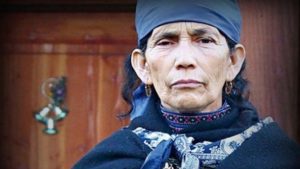EDITOR’S NOTE: While we in the Pan-Afrikan community in the United States often behave as though Political Prisoners exist only in North America, the fact is that all over the world Indigenous and so-called “minority” communities and those without political and economic power are often marginalized and oppressed, and their efforts to have these abuses addressed often result in the persecution, imprisonment and sometimes assassination of their leaders. Political Prisoners exist wherever there are those in power and those without power. The Global South has a long and sad history of repression as well, from the military coups-d’état against democratically elected heads of state throughout South America and Afrika to acts of repression against Indigenous and tribal leaders by established governments, usually in the interest of global corporations. This report, from the website TeleSurTV, discusses the case of Mapuche leader Francisca Linconao, whose hunger strike in protest of her wrongful imprisonment in Chile reportedly has her close to death. She was apparently targeted because of her resistance to the Chilean government’s continued annexation of Indigenous Mapuche lands, many of which are considered sacred by the Mapuche people. Thus, the US is not the only nation that continuously encroaches upon and takes the land of those who were here long before the people who now rule the land. This report was shared with us by the New York Jericho Movement, which works for the exoneration and release of Political Prisoners in the United States but clearly is aware of similar abuses against communities in other parts of the world who are locked in their own struggle for truth and justice. This particular story will be one for our “Political Prisoner Updates” and the “Free The Land” page in the future. — Bro. Cliff
Chile: Jailed Mapuche Leader Faces Death as Health Worsens
January 4, 2017
A new medical report warns that jailed Chilean Indigenous Mapuche leader Francisca Linconao is at risk of dying as her hunger strike to demand her freedom continues to weaken her already-fragile health.
“The severe deterioration of her health condition can become irreversible and even cost her life,” says the report completed on Dec. 31, 2016, by a certified medical and psychological team. “Among the risks to which the patient is exposed with the hunger strike are permanent consequences in various vital functions, such as neurological, liver, cardiac and renal functions.”
 According to the doctors, the detained leader not only suffers physical deterioration, but spiritual loss of strength as she is deprived of freedom “which prevents her from accessing what she considers her main source of energy, the one that comes from nature, its sacred ceremonies and its mission to offer health.”
According to the doctors, the detained leader not only suffers physical deterioration, but spiritual loss of strength as she is deprived of freedom “which prevents her from accessing what she considers her main source of energy, the one that comes from nature, its sacred ceremonies and its mission to offer health.”
The 60-year-old activist has been on hunger strike since Dec. 23 and only consumes liquids. She was detained in 2013 and accused of arson in an incident that led to the deaths of two powerful landlords and still awaits trial.
According to an interview by the medical team, the Machi or Mapuche leader said she is willing to continue the strike until she can’t go any further.
“I want to live, but I am willing to risk my life,” said Linconao. “I am very depressed because I can’t fulfill my spiritual mission, which is to heal others, to give health and well-being to those who need it.”
Linconao has no access to media and claims that she has been threatened and humiliated by prison officials, according to a statement given inside the Mapuche Medical Center, where she is guarded by six armed policemen.
“When I started the hunger strike, after the third day, they gave me a document from the warden of the women’s prison in Temuco, who said they would sanction me for seven or 30 days after I finish my hunger strike,” said Linconao.
According to the doctors, if Linconao dies during the hunger strike, it would worsen conflicts with Indigenous groups in the country and “would mark a serious precedent in terms of human rights at national and international levels.”
Finally, the medical team recommended alternative measures of imprisonment, such as house arrest, based on the agreement signed by the Chilean state in 2008, which gives this preference to members of Indigenous groups.
According to the report, the Chilean justice system has approved this type of prevention for Linconao, but the ruling has not been fulfilled due to the country’s anti-terror laws.
